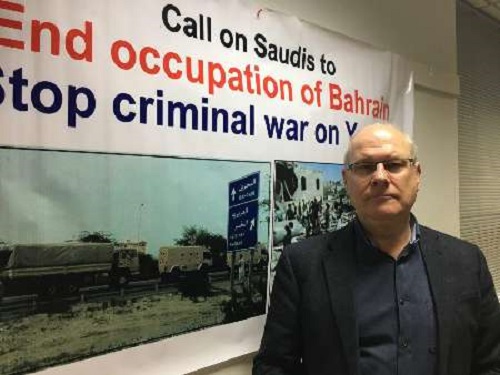London – The Saudis’ interference policy in the region has been a failure so far and the future belongs to the people of the region, said Stephen Bell of Stop the War coalition in London.
He made the remarks in a recent exclusive interview with IRNA in London.
As for the role played by the Saudi Arabia in the region, Bell said that he believed “Saudi Arabia’s role in the region has been negative in recent years.
“The invasion and occupation of Bahrain has set back the democratic movement there and the war upon Yemen has created a major humanitarian disaster.
“The idea that in either Bahrain or Yemen, the Saudis are preventing Iranians from coming to power is ridiculous and hides the fact that the people of these countries want greater freedom and more control over their own affairs.
“Overall we regard it as very negative and we believe that the British and the American governments must take more critical role. Unfortunately, the opposite appears to be the case. It looks like the (US President Donald) Trump administration strongly supports the Saudi regime and this will not solve any of the problems of the region, on the contrary it will make the war in Yemen much worse.
“The reports that the Americans are considering direct military action with the UAE to regain the port of Hudaydah will be a disaster. This is a port which is essential for humanitarian relief and given the famine situation any break in the relief lines can only on catastrophic for the people of Yemen. So We are very concerned about the potential for direct American involvement against the popular militias and we believe that a political process is necessary in Yemen. There must be a national dialogue and the Saudis must end the war.”
Commenting on the Saudis claims about Iran’s influence in the region, the analyst said that he believed “the Saudis are very conscious of popular movements. They are not based on a popular movement themselves. They are based on an elite structure and have relationship with the imperialism which means that any popular movements, any democratic movements in the region they see as a threat.
“Clearly the rise of Ansarallah in Yemen is a rise of popular movement. People see greater autonomy for Yemen, freedom from outside intervention and a more representative national government in Yemen.
“There is nothing threatening in Saudi Arabia as people or state.
“There appears to be a threat to the royal family in Saudi Arabia because they want to continue to control what happens in Yemen. That cannot be the future.
“So it’s the promotion of the idea that Iran is the problem in Yemen is a way of avoiding the real issues and just a way of encouraging western support for the Saudi regime.”
As for the future of the region with the US administration which is shifting its policy towards Saudi Arabia, Bell said, “Unfortunately, in the near future I think there are difficult times indeed. As you say the Trump administration is authorizing the arms deal with Saudi Arabia. They are discussing and considering direct American military intervention in Yemen and the whole approach of the Trump administration to the Middle East is to reinforce American military presence.
“There are no diplomatic initiatives underway and this is extremely worrying given the fact that there are number of conflicts in the region which require diplomatic initiatives.
“If the American administration is simply going to reinforce its military then we are in for a difficult time in the short term.
“That is why we are concerned that the international movements, in support of the people in Yemen and Bahrain in the region have generally become more conscious of the dangers and more active.
“In particular, we want to press the British government to take a step away from uncritical support for the Saudis which is currently exercising.
“We do not doubt this is a difficult fight but this is the fight that we are engaged in. Of course in the longer term the people of the region will achieve their freedom, we just don’t know the time it will take. Therefore, we will do what we can to provide some support.’
M.Wassouf

